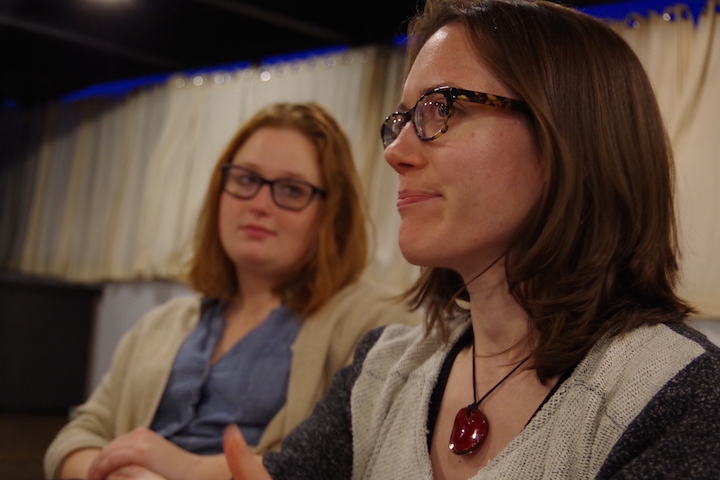
Lucy Gellman Photo
Resident dramaturg Christine Scarfuto.
When the world premiere of Samuel Hunter’s Lewiston hits Stage 2 at Long Wharf Theatre on April 6, stage manager Chuck Turner will be hoping for one thing: that no one in the audience knows who he is by the end of the night.
Or, if the play is really flawless, by the end of the run.
As a seasoned stage manager at Long Wharf and professor at Fordham University, Turner sees it as his role to set the play in motion silently. It’s a victory when nothing gives him, or the technical ballet that he orchestrates behind the scenes, away.

Turner with Ting.
But on a recent Tuesday night, something was different. With Long Wharf Director Eric Ting at his side, Turner was all for exposing the nuts and bolts of the rehearsal process, that audience members might better understand the inner workings of a play. He was part of Long Wharf’s SPARK series, a multi-evening lineup designed to give theatergoers a look at the process inside creating a new piece of theater. The next iteration of the series, on the role of the director, is Tuesday, March 29. The last evening, on April 5, dives into the details of a dress rehearsal.
Started in 2010, the SPARK program has always been intended to contextualize the theatergoing experience for Long Wharf’s public. At past events, directors like Ting spoke about their roles, actors introduced themselves, and backstage staff showed attendees what a final tech rehearsal looks like in real time. But there’s never been a conversation about “what stage managers do,” said Ting, because they’re so behind the scenes. And that, he added, was kind of a problem — because it kept the public in the dark about a very focal position.
“I think there’s a way to think of a stage manager as a conductor … the conductor of a symphony,” said Ting. “The director and the playwright on some level are the composers of the symphony, but the stage manager … is an essential part of that. What’s really beautiful about the sort of theater that we produce here is that … you’re actually creating a multidimensional journey for the audiences.”
Turner explained what that meant for him, after more than nine performances and 10 years working with Ting. “My mom always says, in a very loving, mom way: ‘Chuck makes the magic happen,’” he said at the event, to a smattering of laughs. “I always thought that was very sweet, but as the older I get, the more I work on it, the more I think that it’s absolutely true. A stage manager does a little bit of everything.”
Specifically, he added, that means a sort of pre-rehearsal debrief that he and the director work through — drafting schedules, bringing designers together, getting ready for the actors — followed by intensive work compiling cue lists from different technical departments, communicating in rehearsals and performances with lighting, sound, and pyrotechnic designers, and making sure the actors are on when they’re supposed to be on, and off when they’re supposed to be off.
“I think of it like a dance,” he said. “Like, I’m the other partner in the dance, with the tech behind me. I studied with Anne Bogart [of Columbia University], who sees that in a five character play, the stage manager is the sixth character. I have that relationship. There are some stage managers that really do see management as the bigger part of their title. I feel like night after night, the play is a living, breathing thing. The best stage managers are the people that can figure that out quickly and adjust.”
Around the table, eyes widened slowly. Then several hands went up all at once, questions springing forth from all corners of the room. What was the difference between a stage manager and a dramaturg? Why did a director take a step back after the first or second week of a run? What has Turner seen gone wrong before?
Turner, with the patience of someone who has seen drama, and walked into it with a fireproof suit, charged into all of them with detailed answers. Which, he said as the event wound down, is kind of the point of the series.
“The hours are pretty crappy. The pay is even crappier, and you really have to love it,” he said. “I really do. I love being a part of the birthing of a work — a new work especially — with this group of people. I think that’s an amazing thing to have been a part of. It really is a treat to be a part of it.”
“We do everything in-house, and this is one of the few opportunities we have to invite the audience into that process,” added Elizabeth Nearing, community engagement manager at Long Wharf, after Turner’s conversation. “I think many audiences don’t know what happens before it gets to the stage. It’s so commonplace for us, but for an audience it’s exciting to go back to basics like this.”
Long Wharf Theater’s SPARK program runs March 29 and April 5 at the theater, at 222 Sargeant Dr. Events are at 7 p.m. Admission is $30 for the entire series.